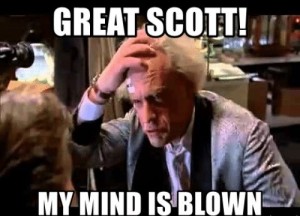 “I heard Scott Miller say it,” the man sitting next to me said.
“I heard Scott Miller say it,” the man sitting next to me said.
“Really?” I responded, somewhat incredulous. After all, I didn’t recall ever saying such a thing. More to the point, it’s just not something I would say. Its wrong. Then again, it was clear he didn’t know that I was Scott Miller. Not wanting to disrupt the presenter before me at the conference, I’d quietly snuck into the room, dressed in my “civies,” shortly after the meeting had started.
“Yep,” he replied, his voice full of certainty, “as I understand it, he says it all the time.” Making “air” quote marks with his fingers, “If the client is not changing within three visits, you should terminate the treatment.”
You should have seen the look on his face when later our eyes met as I took to the stage to do my presentation.
On many occasions over the years, I’ve heard people quote me saying things I’ve never said. Here’s a common one:
“Scott Miller says all you need for successful treatment is a good therapeutic relationship.”
Just so you know, I’ve never said this. Ever. And yet, once, after I corrected a nationally known practitioner in front of a large audience, he nonetheless repeated it in his newsletter. Here’s what I have said and continue to say:
- All treatment models work equally well. All.
- Of all the factors affecting outcome, the specific approach used has the smallest impact. By comparison, the relationship between client and therapist contributes eight to nine times more.
Another:
“Scott Miller says therapists help 80% of their clients.”
Once again, I’ve never said this. In this instance, the misquote is more understandable. Here’s what I do say at almost every workshop:
- Decades of research and hundreds of study document psychotherapy works.
- The effectiveness of psychotherapy has remained fairly stable over the years.
- In most studies, the average treated client is better off than 80% of the untreated comparison sample.
I’m certain it’s the last of these statements that causes problems. Presented, as it, is in “researchspeak,” it’s easy to misunderstand. Read it again and you’ll see it does not mean we help 80% of our clients. Rather, its about the advantage therapy offers relative to receiving no treatment at all. By contrast, the percentage we help — as I’ve blogged about on numerous occasions — is actually around 50%.
Now, in the interest of fairness, let me mention something I often say but have never heard misquoted. At nearly of all my workshops, I joke, “The ORS and SRS may not be the best scales ever developed … but they are free!” The latter part of that statement is absolutely true. Clinicians wishing to solicit feedback from clients about their progress and the quality of the therapeutic relationship simply need to register for a free paper and pencil license. That said, recent research out of the University of Nottingham is giving me pause about the other half.
 Just last week, I interviewed Professor Sam Malins who, together with a team of others, has been studying the use of the scales in real world clinical settings for a number of years. In addition to replicating a number of important findings (e.g., the longer you use the ORS and SRS, the more impact they have on retention and effectiveness; spending time gathering information for diagnosis and treatment planning results in poorer outcomes, the scales can be used to identify skill development opportunities), he also found the Outcome Rating Scale predicted … oh, just watch the video yourself. That way, I won’t be misquoted!
Just last week, I interviewed Professor Sam Malins who, together with a team of others, has been studying the use of the scales in real world clinical settings for a number of years. In addition to replicating a number of important findings (e.g., the longer you use the ORS and SRS, the more impact they have on retention and effectiveness; spending time gathering information for diagnosis and treatment planning results in poorer outcomes, the scales can be used to identify skill development opportunities), he also found the Outcome Rating Scale predicted … oh, just watch the video yourself. That way, I won’t be misquoted!
Until next time,
Scott
Scott D. Miller, Ph.D.
Director, International Center for Clinical Excellence


Oneof my professors told me, in graduate school, that if I wanted to be an effective therapist with those lableed “psychotic” I should engage in training, outside of grad school. I spent a few years in gestalt therapy training with 4 trainers where I was in individual therapy with each, consecutively, and in weekly group therapy as a trainee/patient. Then spent five years in therapy with a medical orgonomist and learned about Reich’s unique and effective approach. Over the years, while I generally kept my knowledge of Reich to myself, given the castigations and criticisms I would have succumbed to by those who learned cognitive behavioral therapy in grad school and nothing else. Then studied with Richard Bandler and John Grinder. As an elected President of the State Psychological Association Div. of Public Sector psychologists, I posted a paper about the South American and Central American study of the effectiveness of Thought Field Therapy and was screamed at by subsequent emails citing hateful rhetoric Over the years I supervised psychologists and directly saw how most received no training outside of grad school but were working as adjunct in University depts and seeing many patients. Given my own experience, I always had a hard time understanding this. I’ve directly heard people misquote many therapists. Am now retired and relegate all this to the past with a realization of how many therapists are basically good with rhetoric, bs artists lacking substance. No wonder psychotherapy has received such negative press in some circles.
I’m most excited about allegiance and how we can foster that in ourselves for the benefit of the client. What I see in the video is the kind of passion and investment that seems to make up a big part of allegiance.
Interesting about the less problem description. The positive energized interactions were described as the therapist and client being on the same page which would be the third step of Frank And Franks description of healing rituals.
And…I know with me, if too much time is spent describing the problem then I get more resigned…… I suspect some therapists actually get more engaged with problem description and since models are equally effective that engagement would also likely be important as dreary as that sounds.
Interesting, thought provoking interview. Thanks.
The percentage of client’s we help is “actually around 50%.” (!!!!!!). I’m certainly not going to broadcast in public that I’m a psychotherapist. Would a physician do that? What an appalling statistic – and psychotherapy is regarded as a science! Anyone interested on why I think that’s the case, or how psychotherapy is missing the boat, search my name on PsycINFO, or contact me by email. Hint: Psychotherapy has yet to understand its subject matter; i.e, the client’s experiencing.
The interview seemed almost incoherent to me although it did seem to make sense to Dr. Malins and Dr. Miller.
It seemed, at first, that the point was that administering ROM does not provide benefit in and of itself, but the use that the therapist makes of the ROM feedback in the therapist’s work with the client is where the benefit is achieved and that this gets better as the therapist becomes more competent with practice.. Dr. Malins, a couple of times by way of example, alluded to things the therapist might say based on client feedback, but it wasn’t clear.
Further, the point also seemed to be that the more practice that the therapist has in untilizing ROM with the client, and the more skilled the therapist becomes in doing this, which can sometimes take a few years of practice the greater the benefit to client outcome, but it is not clear to me exactly what the therapist is practicing? What are these microskills?
From what I understand about FIT, it seems that the therapist’s openess about and obtaining and utilizing feedback from the client to adjust the therapist’s behavior in interacting with the client, promotes better outcomes, but how this is done and what it looks like specifically eludes me and this interview didn’t help much.